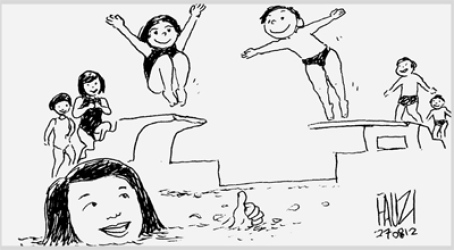Springboard to success
Professor Tan Sri Dato' Dzulkifli Abdul Razak
Learning Curve: Perspective
New Sunday Times - 03-09-2012
ADDRESSING COMPETENCIES: Create a template for our tertiary institutions to cope with the demands of nurturing talents for the 21st century
PANDELELA Rinong Pamg is now a household name. I recently overheard someone asking about a milk product with her picture on it at the supermarket. The shop assistant had no problem in finding it.

The 19-year-old Olympian must be swept off her feet with all the publicity that she rightfully deserves. And the pressure must be building for her, just like in the case of celebrities. Some are able to handle it, others are not.
The nation, indeed the world, is watching the Olympic bronze medallist! She deserves the best counselling on her future as an Olympian, a potential university student, and, of course, as a person with a right to a private life. This is a vital combination that I label the "Pandelela Phenomenon" as in addition to being a rarity as a young Malaysian Olympian, she also comes from a modest socio-economic background and is facing a challenge in the future. Can she clinch an Olympic gold medal in due time?
We are already reading about her dilemma of where to study. She has an offer to study abroad as well as at a local institution. She will have to choose the latter if she stays with the coach who thrust her into the international limelight. And that can cause another predicament.
Firstly, local universities are not known for training Olympians per se, at least not in diving. Our range of facilities and expertise is far from adequate.
Secondly, our tertiary education is better known for rigidly recognising talent. We go by grades mostly, less by aptitude. As a rule of thumb, there is no psychometric test to determine the latter for entry into a university. So marks take precedent. When Universiti Sains Malaysia introduced such a test carried out independently by Majlis Peperiksaan Malaysia in 2009, it noticed marked gaps between grades and aptitude. One size does not fit all.
Those who excel in sport are not necessarily "poor" academically until we apply the grades regime as the only indication of being "good". Most applicants will meet the 10 per cent allocation for extra-curricular activities as a requirement to enter public university.
Thirdly, the mindset that university education is a linear process to be hurriedly completed in the shortest time possible is another hindrance to excellence in sport. Sport talents take years to nurture before being able to compete, and win, internationally. It only takes three to four years to complete a degree course. Extensions are not encouraged, especially when the aim of "education" is a paper chase for employment and not for self-fulfilment such as winning at the Olympics.
As a norm, a system of academic credit repository does not exist where students can weave in and out of a university system, in a non-linear, zig-zag fashion, and still earn a degree at the end of it all with added experiential learning too. This only applies to a limited, officially approved one-time mobility programmes.
In short, we need an open flexi-system of education to make the "Pandelela Phenomenon" a reality. This phenomenon is of utmost importance because it could be a future template for fashioning our tertiary institutions to cope with the demands of nurturing talents for the 21st century.
We have long known about the concept of multiple intelligences that we are all endowed with. It will be a disaster if we continue to obsess with only one measure -- the mathematico-linguistic type -- and discard the rest, including the kinesthetic one where Pandelela naturally excels. Yet we talk about the so-called 21st century competencies.
We need to do away with the image that our higher education institutions are "graveyards for sport" and turn them into springboards for aspiring medal-winning Olympians.
Our fervent hope is that Pandelela will be able to create the "Pandelela Phenomenon" for the benefit of the future generation.
- The writer is the vice-chancellor of Albukhary International University
